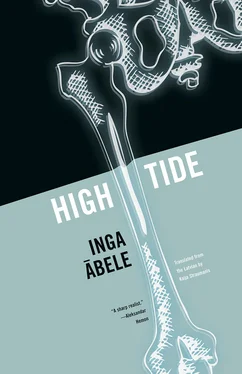“After many days traveling they came to a place where thick osier bushes and tall poplars hid the entrance to the underworld; the travelers pulled the ship ashore and stayed to guard it. Odysseus went on alone. When he came to the entrance of Hades, he proceeded as Circe had instructed him: he first poured the libations of milk, honey, wine and water, then, to draw out the ghost of Teiresias, killed a black ram and spilled its blood into the pit he had dug in front of the entrance. A swarm of ghosts appeared at the pit to drink of the warm blood, but Odysseus kept them at bay, so that he may first hear the ghost of the graying Theban augural Teiresias, which was slowly approaching the pit.”
Andrejs thought of Aksels. If Andrejs had a blood-filled pit at the entrance to the underworld like that, then Aksels would definitely be lurking by with a ravenous stare.
“Then Odysseus’ mother neared the pit; she had died of grief in her son’s absence.”
Andrejs thought of his own mother. When Ieva stopped coming to see him, his mother slowly took her place. But that was completely different. His mother brought him a bag filled with bacon, eggs, onions, black tea, and cigarettes, made him dinner and then fell asleep exhausted from the work. In the evening she’d wrap up her hair, kiss her son once on both cheeks, and cry when they parted the next day.
Her visits to her son in prison were like visiting a ready-made recreation center.
She’d quickly tell him a few important pieces of news — what was new, who had died — and then was quiet.
“Then Odysseus’ mother neared the pit; she had died of grief in her son’s absence.”
Andrejs thought of his mother’s large, overworked hand as it hung over the side of the bed, where she slept like a log facedown on the pillow.
“Then Odysseus’ mother neared the pit; she had died of grief in her son’s absence. She told Odysseus that his home in Ithaca was still amass with relentless suitors for Penelope, who faithfully awaited the return of her husband, but that his son, Telemachus, was too young and weak to drive the suitors away. Old Laërtes, who grieved the fate of his son Odysseus, had left the city and was living in the countryside among slaves.”
Andrejs thought of his father. His father didn’t care about Andrejs’s fate. Maybe a quiet ache smoldered somewhere deep down in him. The rest had been eaten away by a lifetime of hard work. He knew how to take good care of his tractor — but never of himself. His father hadn’t let himself want anything for a long time. Not his son, not his future, not even his past.
His father’s two great thoughts:
— you have to live the life you’ve been given;
— a person lives and works, and then one day he’s clocked from behind with a shovel and pushed into a grave.
“Old Laërtes, who grieved the fate of his son Odysseus, had left the city and was living in the countryside among slaves. In winter he sleeps on the ground by a hearth, and in warmer months sleeps in an orchard on a bed of soft leaves.”
And yet. Andrejs’s mother had said his father had been getting soft in the head with age. He was supposedly dried up and fragile as a bird, and cried a lot. He’s on his way out, that’s why he’s grown as brittle as shortbread, laughing through his tears.
He doesn’t want to experience that, wouldn’t be able to watch it. This abusive, hard, and spiteful man who didn’t have a heart — a crier?
Anything but that.
Once, his mother came with a secret. Unlike the other times, she was kept awake by an unusual restlessness. She sat on the bed, chewed the hard candies she’d brought for him, swung her leg back and forth, and watched him as he smoked by the window. Outside it was a hot summer afternoon.
Andrejs looked back at her and finally asked her straight out:
“What?”
His mother blushed, wiped a handkerchief across her forehead, then spoke rapidly:
“Ieva came to visit.”
Andrejs sat backwards on a chair and drilled his stare into his mother’s lowered eyes. She glanced up at her son and grew frightened, understanding that she had to quickly finish saying what she’d started:
“She’s a big deal now, been to all kinds of schools, has a car. She went up to Dad, and he flung his arms around her neck and cried, told her she would always be welcome in our home. But I… I couldn’t just stand there… Eh, and how could I, I had to say it, told her she’d damned and betrayed my son, left him to rot, and for her to keep far, far away from my house, or I wouldn’t be held responsible for my actions!”
His mother grew red in the face as she spoke, and gestured wildly as if trying to push the image of Ieva away from her:
“But about your girl, I told her she could hide her wherever she wanted — when Andrejs gets out of prison he’ll see his daughter, no doubt about it!”
Andrejs turned back to the window. Mom, you’re lying, I know you too well — he could have said it. You know you love Ieva, he could have told her. But he said nothing. Outside a cat walked along the carefully raked strip of sand.
Having unloaded the weight on her heart, his mother fell asleep quickly.
Outside it was a hot summer afternoon.
He had found his religion in the Ancient Greek myths. He read about Scylla and Charybdis, about the Cyclops Polyphemus and the nymph Calypso, about the suffering of Prometheus, and the courts of Hades. Andrejs, who spent his days and nights with murderers and thieves: he read and understood.
A son who, instructed by his mother, took a sickle and castrated his own father, whose blood mixed with sea foam to give birth to the goddess of love. A father who, terrified of the power of his own sons, swallowed them whole. The Graces, muses, and Moirae — almost every prisoner had his own; distance, isolation, and desire raised them above the gods. Zeus was Andrejs’s favorite. Thirsting for knowledge and afraid of losing power, this guy had swallowed his first wife, which was what his mother had wanted. “Zeus swallowed wise Metis, in doing so both eliminating an heir and gaining Metis’s wisdom.”
He understood that kind of love, not the whining adoration coming at you constantly as songs on TV and the radio. He’d like to swallow both Ieva and Monta, they’d be in his stomach — Ieva’s wisdom and their daughter’s beauty, everything together in one place, home. He didn’t know how to love, only wildly desire, and it was among the Ancient Greek heroes that he found where he belonged. Here, in prison, there was no shortage of jealous women just like Hera, who murdered her rival’s children and took sleep away from her so she would have to wander the world like a ghost; until Zeus took pity on her and gave her the power to remove her eyes so she could finally rest. There were those like Danaus, who made his daughters kill their husbands. Or those like Tantalus who, in an act of unbelievable arrogance, sacrificed his son and offered his flesh to the gods. And those like Demeter who, distraught by a great loss, blindly ate everything the goddess of fate put before them, even the flesh of others, and not to mention such delicacies as sorrow, desperation, and alcoholism. Here you could find Ares with all his evil forces, whose sons were Terror and Fear, and who found joy in bloodshed.
Andrejs liked the retelling of these stories because they were about a time before anyone had been crucified for the sins of others, and before anyone had been saved.
Prison was the place where priests fished for souls day in and day out like pearl divers — forever looking to take confession. This frightful, shaved, robust, dark-eyed mob, a priori guilty, was the perfect material onto which they could cross-stitch those pearls.
He went to mass and listened, but never for a moment felt in his heart the main thing the priests asked them to feel — the desire to fall at the feet of Christ and call him their Lord and Shepherd, to transfer the responsibility for what they’d done onto their Lord and Shepherd and to beg for forgiveness. Andrejs could fall at the feet of Christ like he’d fallen to the floor next to the dead body of a stranger in a darkened cell. There was no question that Christ had definitely been a regular guy. He could wash Christ’s feet and trim his toenails, like he’d done on more than one occasion for an aging cellmate who had been exhausted to the point of lethargy. But he was unable to feel the most important thing — the desire to shift his guilt onto the shoulders of some Lord. Andrej’s guilt was his business, it was a part of him. Here he stood with his entire life and was completely aware of it. Though it was hazy, he could sense his freedom and responsibility within it.
Читать дальше












